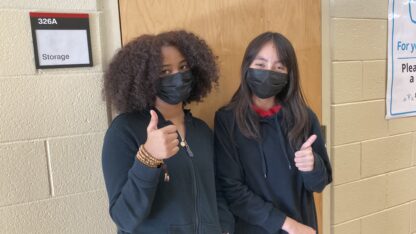A Cobb high school gets results using ‘good’ behavior referrals
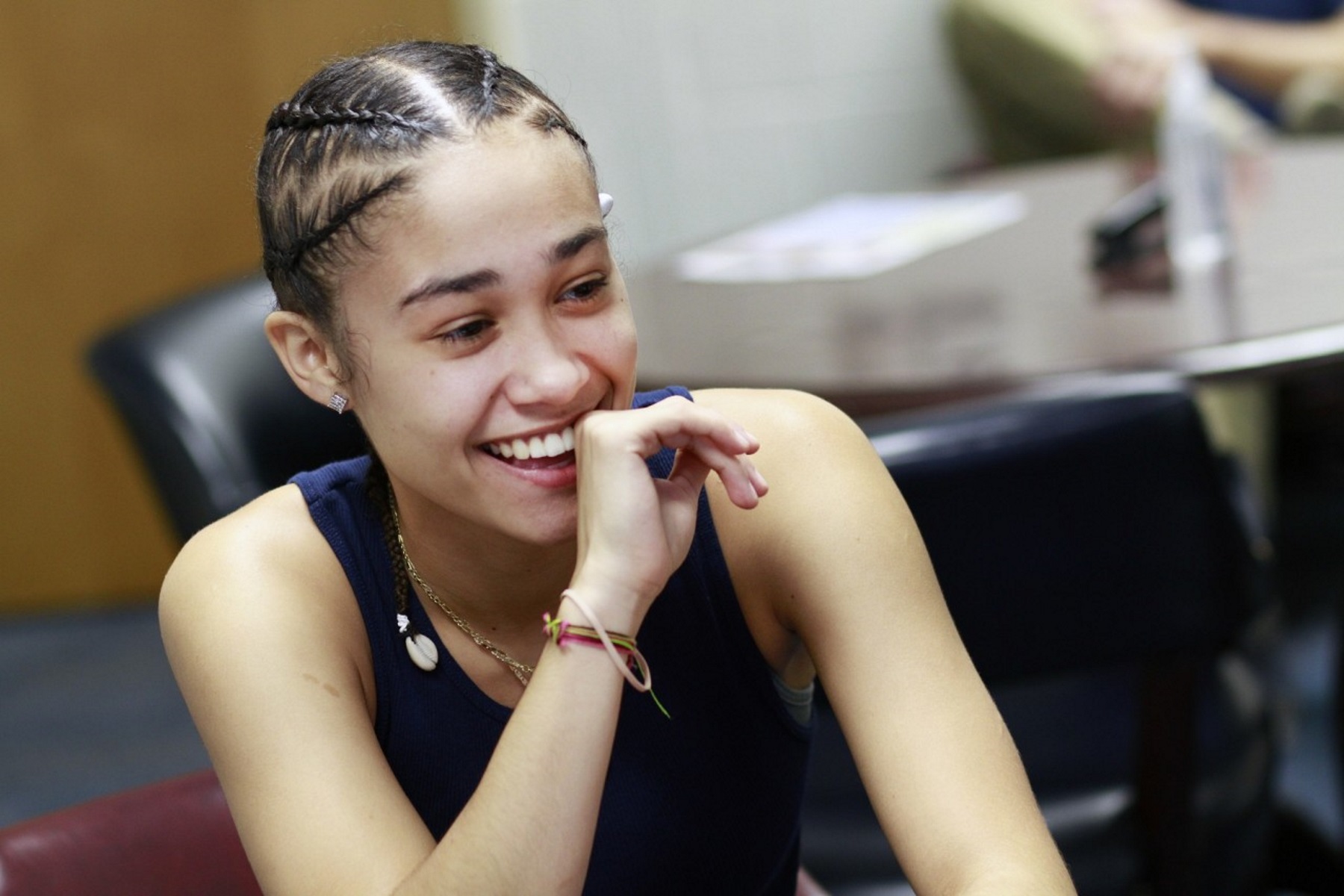
McEachern student Naomi Montez reacts to the positive behavior referral her teacher gave her. Assistant Principal Dan Torrenti broke the news to her. At McEachern High, teachers can change their approach to discipline by writing kids up for positive behaviors. (Kaitlin Kolarik/For WABE)
Kaitlin Kolarik/For WABE
Getting in trouble at school isn’t any fun, especially if it ends in detention or a suspension. According to research, those punishments don’t improve students’ behavior.
At McEachern High School in the Cobb County School District, teachers have the option to change their approach to discipline by writing kids up for positive behaviors instead of just focusing on negative ones.
The Evolution Of An Idea
The idea started with a teacher, Dr. Matthew Lawrence, who teaches economics and history.
“It was my standard practice to go home on a Friday and make all of my negative phone calls …failing test grades, attendance, discipline and so forth,” Lawrence said. “I would always finish up that process by making a couple of positive phone calls to parents of kids who’d just done a really good job that week.”
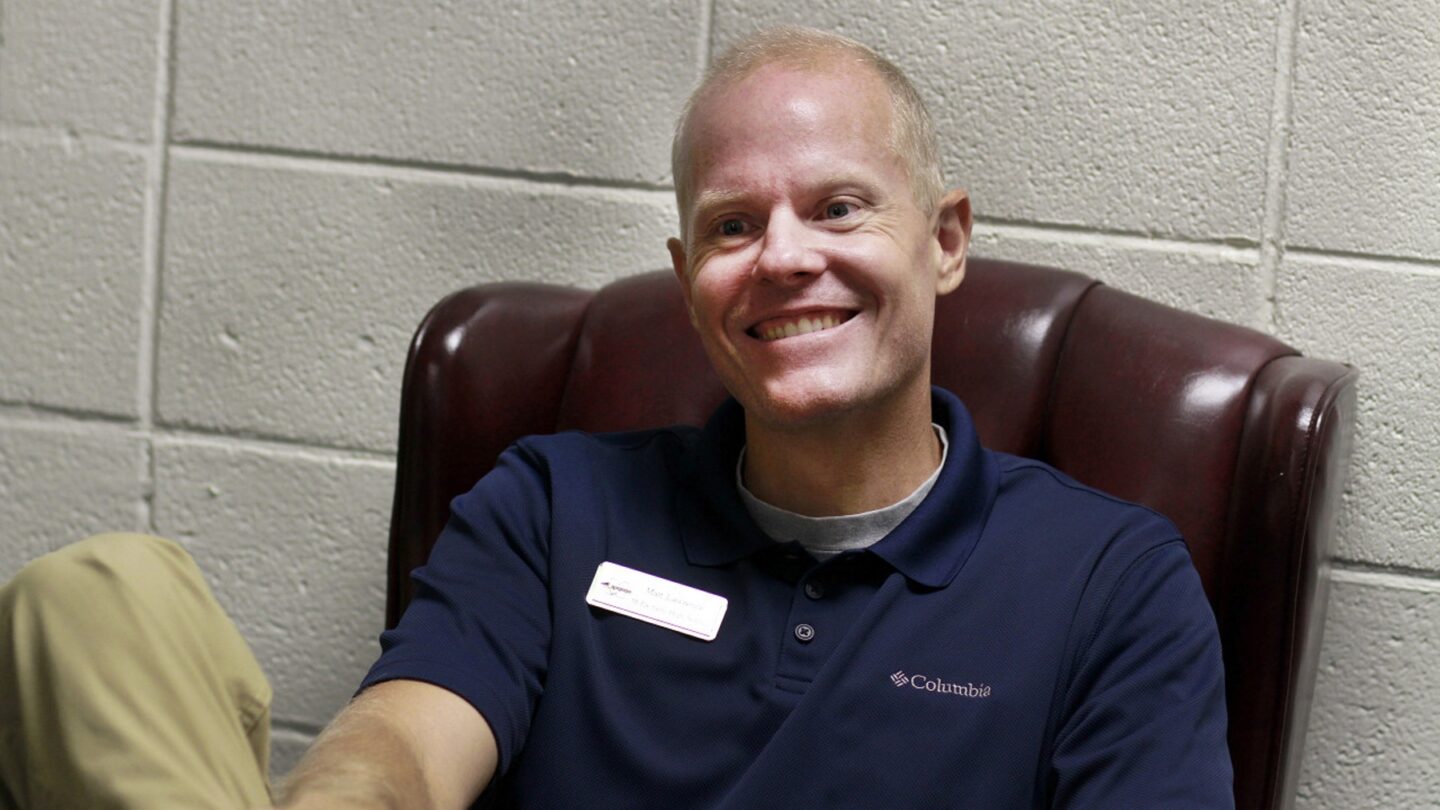
Lawrence said those positive calls made a big difference to his students.
“The kids would always come in that Monday and they would be so appreciative,” he said.
What was missing, he thought, was an official recognition of his students’ performance. Then, a friend of his who teaches in Florida mentioned her school writes positive discipline referrals for students. So, he reached out to McEachern’s principal, Regina Montgomery.
referral [rih-FUR-uhl] (noun): a document used to detail students’ (usually negative) behavior. It can result in detention, suspension, or other consequences.”
“What I said was if we could kind of change the paradigm and be a school that writes more positive referrals than negative referrals, then we would have something to brag about over the entire county and perhaps the state,” he said.
He was a little worried about adding to Montgomery’s workload, but she was instantly supportive.
“We try to encourage our teachers to bring forth ideas on how we can make our school better, so I was excited,” Montgomery said.
Montgomery immediately implemented the program. Any teacher can participate, but it’s not required.
The process involves teachers “catching” students behaving well — whether it’s a great attitude or good grades — and then writing down those observations on a discipline referral form.
The document goes to assistant principal Dan Torrenti. He calls students into his office one by one. They have no idea why they’re being summoned. Torrenti surprises them with the good news. He calls their parents in front of them to tell them, too. He gives them a copy of the referral. Another copy goes in their file, the way a report card would.

“Now, people look [for] and report the positive,” Montgomery said. “So many times we take the positive and think, ‘Oh, that’s just the way it’s supposed to be.’”
But letting kids know when they’re on the right track reinforces their good behaviors, she said. Lawrence said he’s seen a big difference since he switched his approach a few years ago.
“Kids who are sometimes on the borderline of making bad decisions, if you catch them doing something good and write them up for doing something good, I’ve found it can change their entire trajectory for the rest of the semester,” Lawrence said.
Accentuating The Positive
While McEachern’s plan is homemade, schools are increasingly moving toward positive approaches to discipline and away from “zero-tolerance” policies that come with harsh punishments for breaking rules.
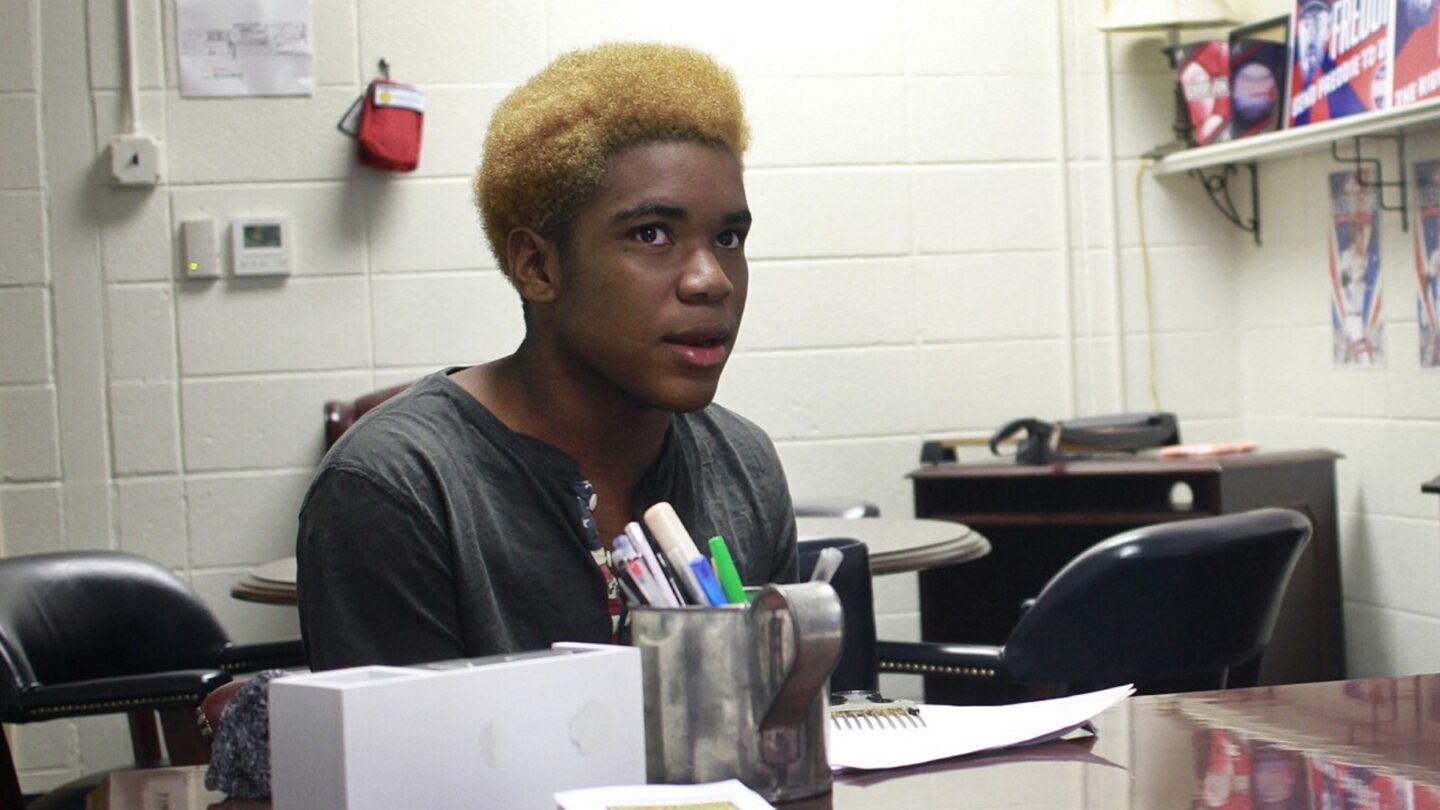
Schools that have adopted programs like Positive Behavioral Interventions and Supports (PBIS) and Restorative Justice report good outcomes.
“In schools today, there’s an increasing focus on Social Emotional Learning, and it is through positive relationships and modeling that students and staff can increase their social-emotional competencies,” says Anne Gregory, a psychology professor at Rutgers University who has researched school discipline practices. “So, there’s growing recognition that some of the best predictors of success, both in school and also in the workplace, is this notion of emotional intelligence.”
Gregory said McEachern’s method of writing positive behavior referrals should have a big effect on students.
“We have a lot of evidence that praising positive behavior can strengthen that positive behavior, especially when teachers are using what’s called ‘specific praise,’” she said.
Kids who are sometimes on the borderline of making bad decisions, if you catch them doing something good…I’ve found it can change their entire trajectory for the rest of the semester.”
Matthew Lawrence, economics and history teacher at McEachern High School
That’s what McEachern teachers do when they write positive referrals. Torrenti reads the comments to each student and to their parents. One student, Naomi Montez, is surprised by the comments Torrenti reads to her:
“Mr. Lawrence says … he’s been greatly impressed by your level of effort, your grit, your determination and your commitment to excellence,” Torrenti said. “You represent the best of McEachern High School. So, we’re really proud of you.”
When Naomi tells Torrenti she’s surprised, he asks her why.
“I just don’t get awards and stuff like that,” she said.
Torrenti assures her that will change if she keeps working hard. When speaking to her mother, Torrenti mentions what Naomi said. Her mother says Naomi has struggled in the past, and she’s glad to know she’s doing better now.
This process is fun for Torrenti, who is the administrator kids have to see when they get in trouble.
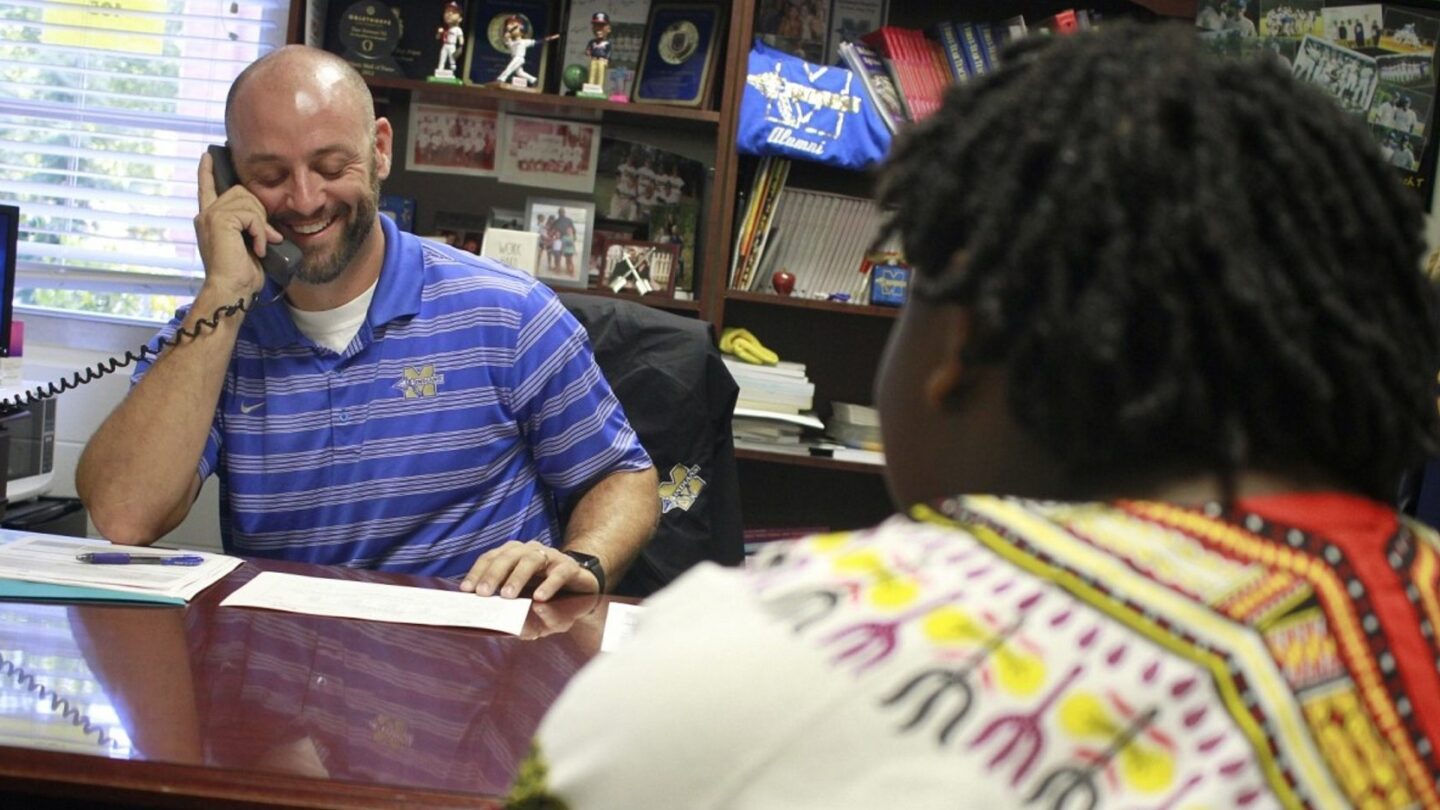
“I’ve said to many kids, ‘I’m not the Grim Reaper. I’m not always the bad news,’” Torrenti said.
The new referral program lets him show students he’s there to help, he said. He also enjoys letting parents, like Naomi’s mom, know that their child is doing well.
“It’s a blast,” Torrenti said. “I love dealing with the kids … but I really enjoy the parent phone call. My three children didn’t come with instructions, and I think it’s just fun to affirm a parent in what they’re doing in raising their child.”
Word Travels Fast
Anne Gregory, of Rutgers, says positive discipline programs like McEachern’s often have a ripple effect.
“Other students will see that kind of social modeling effect, where they’re actually seeing their peers get praised for positive behavior, so they too can join into the positive behavior,” she said.
Matthew Lawrence says that’s exactly what’s happened in his classes.
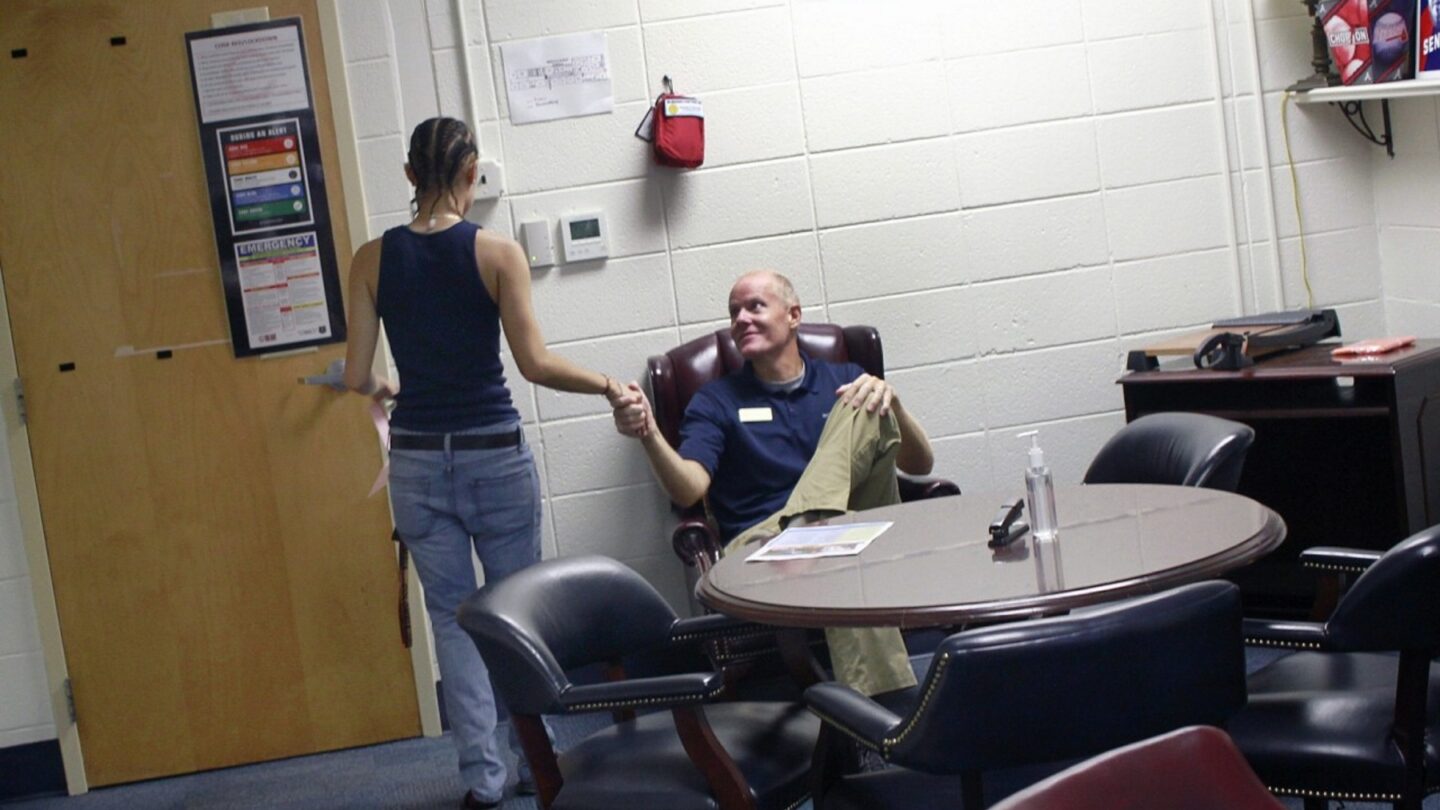
“The word will kind of get out that somebody got one of these [referrals] and then I’ll have other students come to me and say, ‘Hey, Mr. Lawrence, what do I have to do to get one of those?’” he said. “I’ll tell them, ‘You’ve got to take care of business, and you’ve got to impress me, and we’ll see what happens.”
What’s happened so far, according to principal Regina Montgomery, is that as the number of positive referrals at McEachern has increased, the number of negative ones has dropped.

